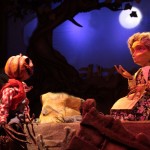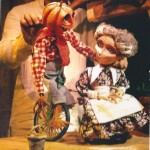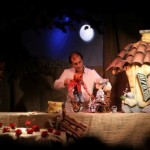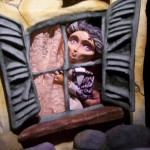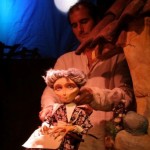Una cabaña olvidada en un bosque remoto y una huerta seca y abandonada es todo lo que posee Alba, la viuda del pueblo. También tiene un hijo, Juan, quién luego de una fuerte discusión con ella se alejó de su casa para nunca más volver. Desde entonces la mujer sobrelleva los días con mucho pesar, atendiendo a duras penas las tareas básicas de la granja día a día, año tras año, sola y en silencio, sin perder nunca la esperanza de que su hijo retorne junto a ella. Pero claro, Alba no está tan sola a fin de cuentas; los mellizos Talbus -dos criaturas endiabladas- la hostigan con sus bromas pesadas siempre que pueden, incluso su padre, el malhumorado Rosco Talbus, no deja de acosarla con todo tipo de jugarretas y artimañas para que le venda la tierra, su cabaña la huerta… Pero en medio de tantas adversidades, la fantasía, el amor, los deseos más profundos -y por que no-, también los milagros, se hacen presentes en la huerta para darle vida a un escuálido espantapájaros quién, henchido de vida, hará gala de toda la humanidad y el corazón que no tiene para ayudar a la viuda y protegerla de las más cruentas amenazas.
“El viento entre las hojas” es un relato escénico colmado de lirismo y poesía, interpretado de manera magistral, cálida y emotiva por la primera actriz Norma Aleandro, quien prestó su voz y su enorme talento para plasmar en escena los distintos matices que sugiere la historia.
La Compañía Omar Álvarez Títeres y Rafael Curci intentan esta vez captar la atención de grandes y chicos a través de un espectáculo sencillo y despojado, donde los títeres y la pericia del titiritero sumados a la calidez del relato se ensamblan de manera tal que se vuelve casi ineludible el paso por el mundo de la magia, la fantasía y de la emoción. Y si esta historia de “El viento entre las hojas” es como la imaginamos, ningún espectador podrá atravesar esos mundos sin salir conmovido de ellos.
The wind in the leaves
An abandoned hut left in a remote forest and a dried and forsaken kitchen garden is everything that Alba has, the widow of the town. She also has a son, John, who after a vigorous fight with her, he (grew apart) left his house and never return. Since then the woman endured days with great sorrow, hardly taking care of the basic chores of the farm day by day, year by year, alone and in silence, without losing hope that his son would return to be with her. But of course, Alba is not that alone in the end. The Talbus twins- two mischievous creatures- will play dirty tricks on her with their practical jokes every time they can, even her father, the bad tempered Rosco Talbus, does not stop bothering her with all types of dirty tricks and ruses so that she would sell her land, her hut, her kitchen garden… But among such adversities, fantasy, love, the deepest desires-and why not- miracles take place in the kitchen garden to bring an emaciated scarecrow to life who, burst into life, will glory in mankind and the heart that he lacks to help the widow and protect her of the most bloody threats.
“The wind in the leaves” is a scenic (account / story) filled with lyricism and poetry, brilliantly, warmthly and emotionally performed by first actress Norma Aleandro, who granted her voice and her (immense, colossal, enormous) talent to capture the different blendings that the story suggests.
Omar Alvarez Tìteres and Rafael Curci’s Company (captures, draws) the attention of grownups and little ones through a simple and bare show, where the puppets and the skillfulness of the puppeteer plus the warmth recount are assembled in such a way that it is almost unavoidable to feel the world of magic, fantasy and excitement. And if this (account / story) “The wind throughout the leaves” is what we imagen, no member of the audience will go through those worlds without being touched by them.

